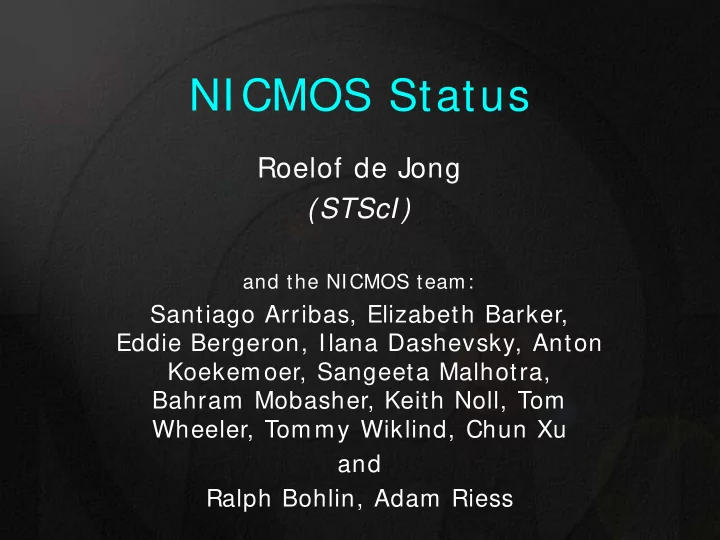

NICMOS Status Roelof de Jong (STScI) and the NICMOS team: Santiago Arribas, Elizabeth Barker, Eddie Bergeron, Ilana Dashevsky, Anton Koekemoer, Sangeeta Malhotra, Bahram Mobasher, Keith Noll, Tom Wheeler, Tommy Wiklind, Chun Xu and Ralph Bohlin, Adam Riess
Overview • Instrument • Pipeline • Photometry • (Non-)Linearity & Zeropoint • Calibration plans
Instrument • Very stable due to NICMOS Cryo-cooler System (NCS) • Darks, Focus, Flats, Temperature stable • 2-gyro mode observations successful • New SPARS MULTIACCUMs added Poster P3-4 Xu – SPARS4, SPARS16, SPARS32, SPARS128 – SPARS sequences preferred for anything that has no huge dynamic range
Instrument: dark current • Dark current stable (near day 600 persistence of Mars observation)
Instrument: focus
Instrument: 2-gyro mode PSF nominal Coronographic rejection identical (no second roll angle in same orbit) Poster P3-7 Malhotra
Pipeline/ software updates • MultiDrizzle implemented for NICMOS P3-5 Bergeron • Routines available for – SAA cosmic ray persistence removal P3-6 Koekemoer – Crosstalk removal (Mr. Stay-puft) • Improved imaging and new grism Exposure Time Calculator (July 2004) – Continues improvements made, always use the latest version for you proposals
In the pipeline for the Pipeline • Improved reference files – Better darks for 77.1K • SAA clean • Mr. Stay-puft (quadrant crosstalk) • Temperature from bias • Amp glow persistence • Improved treatment of Cosmics removal – Reduces noise in pixels affected by cosmics
Photometry • New photometry keywords/ zeropoints – Delivered July 2004 – Main differences with previous values: • Separate values Cycles 7/ 7N and Cycles 11+ • Wavelength dependent aperture corrections • Improved (latest) data reduction methods • Better tied to ground-based measurements
Photometry: sensitivity change • Detector sensitivity improved going from 66 K to 77.1 K after NCS installation
Photometry: aperture corrections • Going from Aperture radius fixed to infinite NIC1 11.5 pix apertures NIC2 6.5 pix NIC3 5.5 pix • Wavelength dependence determined from TinyTim PSFs
Spectro-photometric calibration • P330E - Solar Analog – Spectrum: measurements + model • G191B2B - White Dwarf – Spectrum: LTE model • Tied to ground based through Persson et al. Standards (2MASS) (details in forthcoming ISR)
Photometry: count rate standards • Other HST spectro- photometric standards consistent
Photometry: time evolution • Some sensitivity loss in NIC2 • Data in other two cameras too noisy
NICMOS non-linearity • Classic well depth non- linearity well understood • Dependents on total QuickTime™ and a TIFF (LZW) decompressor are needed to see this picture. counts, not count rate • Corrected in pipeline
Count Rate Non-linearity • Stellar standards over a broad magnitude range were observed with the grisms • Comparison with overlapping STIS spectra revealed an unexpected disagreement between STIS and NICMOS • ACS data suggested NICMOS as the source of the difference • Potential for important consequences to key NICMOS science makes this effect important to understand
Non-linearity: NICMOS vs ACS • Similar effect when comparing NICMOS grism to ACS photometry
Non-linearity: wavelength dependence • Compare observed NICMOS spectra to white dwarf models extended to IR from STIS optical • Effect strongly reduced at longer wavelengths
Non-linearity: NICMOS spec vs phot • Agreement between observed NICMOS spectra and photometry within errors • Poor agreement when spectra are corrected to STIS flux expectations
Non-linearity: lamp off/ on test • Increase total count rate by adding light of the flatfield lamp to the background • Count rate increases as predicted by non-linearity (cycle 7 NIC2 data)
Non-linearity: no trapping signal • MULTIACCUM sequences nearly stable independent of count rate • If non- linearity caused by charge traps, time scales have to be longer than 500 seconds
Non-linearity: The evidence • NICMOS grism vs – STIS & ACS spectra – ACS photometry • Lamp off/ on test • Supernova models ACS -> NICMOS J&H • Narrowband vs Broadband filter throughputs ground vs. inflight • UDF inconclusive
Non-linearity: UDF vs. ground • Use color corrections or template fitting to match F110W to J ground • Different results depending on reduction (talk Mobasher & Thompson) • Effect expected to bottom out at sky level, ~ 23 AB-mag F110W for point sources, earlier extended sources • Maximum effect ~ 0.2 mag in F110W, no effect expected in F160W
Non-linearity: Unknowns Count Rate ∝ Flux α ( λ ) or Electrons α ( λ ) α (F110W)~ 1.02, α (F160W)~ 1.00 • Only incoming photons or add dark current? • Power law correction full count rate range? • Same exponent in all cameras? • Same wavelength dependence in all cameras? • Temperature dependence (cycle 7 vs 11+ ) • Pixel-to-pixel dependence? • Persistence? • Physical explanation!
Calibration plan • Usual monitoring: dark, flat, focus, photometry • Lamp off/ on/ off test: imaging and grism, different filters and cameras • Persistence tests using bright stars and flatfields, test wavelength and count rate dependence • Deeper photometry on faintest standards • Check consistency between 2MASS and NICMOS in Orion legacy survey field • Low frequency flat measurement in Camera 1; monitoring data show residuals with position • Non-linearity correction: may be hard to implement backward compatible with previous reductions Poster P3-1 Arribas
Conclusions • Instrument very stable with NCS • Photometry: – Improved aperture corrections – Possible count rate dependent non-linearity at λ < 1.6 micron – Test are scheduled in November to quantify non-linearity • For latest news check NICMOS website • Subscribe to the NICMOS STAN newsletter
Recommend
More recommend